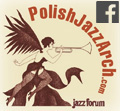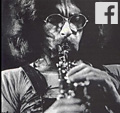Zbigniew Seifert in Memoriam Berlin - The Polish Presidency
Opublikowany: 2011-10-03 09:31:00
Czas trwania projektu: 26th November 2011, Berlin

A concert dedicated to the great Polish violinist, sax player and composer was held on 26th November 2011 at 8 pm.
The concert was organized as a part of CULTURAL PRESIDENCY PROGRAM
Performers:
Mateusz Smoczyński – vn www.smoczynski.pl
Ack van Rooyen – tr http://www.ackvanrooyen.com/
Richie Beirach – p http://www.richiebeirach.com/
Glen Moore – b http://www.oregonband.com/
Janusz Stefański – dr
ATOM STRING QUARTET www.atomstringquartet.com:
Dawid Lubowicz - vn
Mateusz Smoczyński - vn
Michał Zaborski - vl
Krzysztof Lenczowski - vc
Ticket information: http://www.jazzwerkstatt.eu/
Artists about Zbigniew Seifert:
Prof. Richie Beirach:
Zbiggy was an angel who happened to land in Poland and chose the violin as a way to inspire, elevate, enchant and deliver a powerful message of passion for life in all its magnificent and awesome diversity of forms, it was all in his SOUND, he would play just one note and everyone could instantly and completely hear and feel the immensity and power of his heart, the fundamental and undeniable humanity of his music and his pure joy in simply improvising with other musicians or playing solo violin I had the amazing good fortune to know him well and to play and record with him many times, he and Agnieszka would come to my house in NYC and hang and laugh and play and rehearse, he loved my tunes like al which I wrote for him and my leaving and elm and broken wing and the pearl, then he got sick, and he wanted to do one more recording before he died. It turned out to become his cd PASSION for string orchestra and jazz ensemble with Zbiggy, Eddie Gomez on bass Jack DeJohnette on drums John Scofield on guitar, Nana on percussion on myself on piano. Zbiggy somehow was able to integrate the strings with the jazz ensemble seamlessly, he was sick and sometimes feeling weak but he played like a that angel burning with a superhuman intensity that soared above and away from this earth yet was truly of it, its my favorite cd that I’ve ever heard or been part of, few people knew of him, but the ones that did and do know that HE is the source of the modern post-Coltrane violin.
With love, joy and rememberance
Dave Liebman:
My brother Richie Beirach knew Zbiggy personally making his comments all the more touching. All I can add from the musical standpoint is that the solo violin record Zbiggy made is one of the monumental works of our time. I make it mandatory that anyone professing to play "jazz" violin study the recording. Zbiggy went passed the instrument into the world of universal music, spirtual and deep with John Coltrane as his guide. This recording in particular will insure that Seifert's music will be with us for ever.
Ack van Rooyen:
Although many years have passed by since Zbiggy left us, the impression he left is still vivid.
The violin was rare then in this type of music, but the way he played was ahead of his time.
I understand his music now more than I did then.
He was a pioneer.
Glen Moore:
I first heard Zbiggy on a cassette that Jeremy Steig made in Berlin in 1969. He was playing a solo on Autumn Leaves. At first I thought was a string quartet playing.
Then I heard him play a gig in Avignon with Toto Blanc in 1976. Paul McCandless and I got together with him the next day and Paul and Zbiggy were such a great inspiration to one another that we invited Zbiggy to come to the US and make the “Violin” recording with Oregon. On my piece “Flagolet” he had suggestions for the improvisation that were so advanced that it took me a couple of years to figure them out. There is still a Best of Oregon album that has a 15 minute free piece from that recording.
Zbiggy mailed me his recording “Man In The Light” which I played for Benny Wallace. Benny loved it because Zbiggy had played saxophone and was able to play most of Tranes licks on the violin.
When I had the opportunity to record a solo for Electra/Aslyum I invited Zbigniev and David Darling along with Jan Hammer to form a super group. Zbigniev conducted all of the pieces (free and written) he played on, taking all of us to new levels of possibility.
He was one of the most inspiring creative people I ever played with.
Prof. Janusz Stefański:
Who was he to me? He was a brilliant musician! A wonderful friend! We met in MusicHigh Schoolin Kraków in 1962. We were peers. I was born on the 14th, Zbyszek on the 7st of June 1946. At that time he was in the third grade and I was in the second grade (since I repeated one year at school). Having changed the school, I started looking for the people I could be friends with and then I found Zbyszek. He played the violin, I was taking the percussion lessons. We both dreamed of playing jazz. Zbyszek was devoted to playing the alto saxophone as at that time he was not convinced that he could play jazz violin.
When Alojzy Thomys and Janusz Mroczek established the jazz section, it turned out that some of the students were interested in joining it. Among others there were Zbyszek, Jan Jarczyk, Jan Gonciarczyk and me. As a result, Zbyszek Seifert Quartet came into being. We used to go to “Helikon” jazz club after school as we wanted to play jazz and get acquainted with Kraków’s jazz musicians.
Our friendship had two dimensions: musical and private.
The fact that it was Zbyszek who founded the quartet was not accidental. He had a great potential and a musical intuition. From the very beginning he knew which style and aesthetic to choose. Coltrane was his God…
While practicing, he focused entirely on playing the saxophone. Even if a helicopter had flown into his house, he probably would not have stopped playing. I admired his approach to playing the alto saxophone. He played in a sharp, dense, avant-garde way, the musical phrases were very complex. His head was full of amazing sounds, he produced them very quickly as if he had known that his time was coming to an end…
His performances were very expressive. He kept playing until his improvisations reached perfection.
He inspired me and influenced the development of my own ideas about playing the drums.
After a couple of years spent on playing the saxophone, he decided to focus on playing the violin again (in Tomasz Stańko Quintet). It had a great influence on his career.
I have never known any violin player who would play the violin the way Zbyszek did. He used the saxophone phrases while playing the violin, which – as he said – was a great challenge. One sometimes had the impression that his fingers were about to break and his instrument was about to kindle. His dramatic and warm sound, beautiful melody and harmony made the listeners participate in his musical journey.
Zbyszek was a deeply spiritual, lyrical and dramatic author at the same time. He was a person of an outstanding intelligence and great sense of humour. His fascinating personality attracted me and for this reason we became good friends.
We enjoyed spending the spare time together – we walked in the mountains, slept in the hay, talked about women…drank and smoked…
During our tour inEuropehe was a great companion. I drove the car and he was a guide.
We liked talking about life, family, fortune and misfortune, hopes and disappointments.
We used to compare our ideas about the future...and we played together as long as it was possible.
His sickness was unexpected and two years later he was gone for ever.
Zbyszek’s music is still present and continuously inspires many musicians all over the world.
Mateusz Smoczyński:
For me Zbigniew Seifert was mainly a great artist who transferred John Coltrane’s style and language into the world of violin. Thanks to him I began enjoying the violin in jazz music and it encouraged me to start improvising. Later on, having listened to his records, I noticed that he developed his own, individual style which derived from John Coltrane’s achievements, as well as from Polish folk and classical music (for example Karol Szymanowski). I am working on developing my individual musical language as well. I want it to be rooted in the music of my idols, such as Zbigniew Seifert.
Press:
Polnisches Institut Berlin http://berlin.polnischekultur.de
Concert organisers:
Co-funded by the Ministry of Culture and National Heritage.
A project marking Poland's Presidency of the Council of the European Union.
Media patrons:
![]()
Invitation to the concert in "Jazz Forum" magazine http://jazzforum.com.pl/news.php?action=show&id=1777
Promotional materials:
concert program available only in German



































